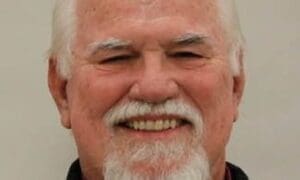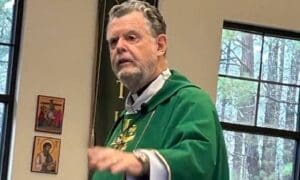Answers to your questions about life, religion and the Bible
Eternal life?
Dear Father Paul: I am a fairly new Christian. I became a believer largely because of the life and teachings of Jesus. The doctrine of “eternal life” for believers was, at the time, an extra bonus. But I find that I am having a hard time getting the arms of my mind around this difficult concept. How can anything last “forever” ? Can you shed any light on the subject of eternal life? — S.D.
Dear S.D.: The subject of eternal life is indeed a difficult concept for anyone, even believers. You have put it well. “How can anything last forever?”
Eternal life is one of what ancient Christians called the “mysteries of the faith,” which include the belief in the miracles of Jesus, his virgin birth, his sinless life, and his resurrection to name just a few Christian doctrines. “How can these things be?” we ask. “All of them are impossible.”
And we are right. All of these and many other aspects of the Christian faith are indeed not “natural,” but are rather “supernatural” and thus cannot be “explained” or even fully understood through our natural human senses. This is where a measure of faith comes in because “faith” is believing in what we can’t see and don’t understand, and we certainly don’t “understand” eternal life. But when we say “yes” to Jesus, God gives us the ability to understand his mysteries — at least to a small extent. Faith must come first. Then can come the understanding all of us seek.
The words eternity, eternal, eternal life or some variation are used over 50 times in the Bible. Jesus himself speaks of eternal life on numerous occasions in the Gospels. The Biblical concept of eternal life, or what some call, “the gift of eternal life,” is for believers only and is, in essence, “perpetual/everlasting life.” Life goes on and on and on, with no end. Basically we are forever with God in the place where he is … either here on earth or in heaven. John 3:36 (NLT) confirms this, “Whoever believes in the Son (Jesus) has eternal life …” Note the present tense, “has.” So all believers possess or have eternal life the instant they come to Jesus in faith. We do not receive eternal life only after we die. This fact should give us, as believers, an abundance of joy.
So, simply put, what is eternal life anyway, Father Paul?
In John 17:3 (NLT) Jesus himself answers this question. He says: “And this is eternal life, that they (believers) may know you, the only true God, and Jesus Christ whom you have sent.”
Eternal life, then, is knowing God and it begins the moment we come to “know” God and his Son Jesus. This knowing God and Jesus cannot be some “academic” understanding or mere “head” knowledge about God and Jesus, but must be a true, inner, personal knowledge, lived out in a daily relationship.
“Then what will eternal life with God be like?” we ask. The Greek word commonly translated into English as “eternal” by Bible translators is the word “aionios.” And aionios interestingly has the connotation of “quality” as well as “quantity.” This means that our eternal lives with God will not be just an endless stretch of meaningless eons that begin only after our deaths, but the highest quality of life, lives spent with God, knowing God and receiving his blessings. Eternal lives that for Christians, again, begin now … today.
Eternal life is wrapped up in the concept of time itself, a concept that the world’s best scientists still do not fully understand today. But God is the creator of time itself, and he operates both inside and outside of human time. With this in mind, it is no big thing for God to insure that his children (believers) whom he created, are rewarded by getting to live forever and eternally with him, their heavenly Father.
“Why does God provide eternal life for those who love and believe in him?” is another question that is often asked.
The simple answer is for us to understand that God is the “ultimate parent” who loves us abundantly, without measure, more than we can think or imagine. More than anything God wants us to live with him forever. And his greatest wish is that all of his human creation will love him in return so that we can spend eternity with him.
Do you have a question? Send it to me at [email protected] and I will try to answer your question in the paper.
[Father Paul Massey is pastor emeritus of Church of the Holy Cross Charismatic Episcopal Church in Fayetteville, Georgia. Visit www.holycrosschurch.wordpress.com for more information, directions, service times and recordings of Sunday messages.]











Leave a Comment
You must be logged in to post a comment.